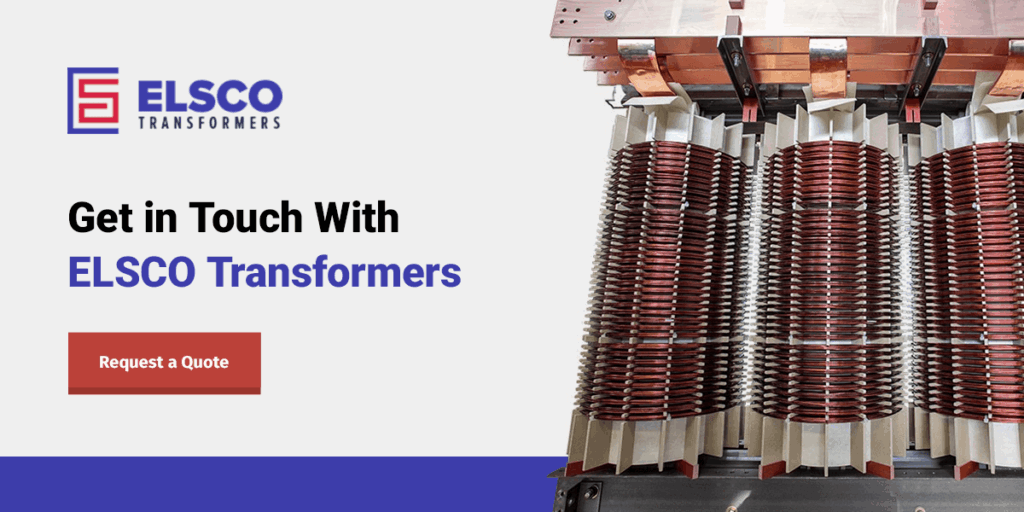
- by Todd Benadum
- May 5, 2025
- Dry Type Transformers, Transformer Build Process
Dry type transformers typically feature either copper or aluminum windings, also known as coils. Transformer windings refer to the coils within the transformer that draw and distribute power inside the unit. There are typically two windings in a dry type transformer — one that draws power from the source and another that transfers that power to the load. Both copper and aluminum windings perform the same function.
For some applications, one type is preferable over the other. The option you choose depends on the specific needs of your facility and your unique requirements. We’ll explain more about how aluminum and copper windings compare below.
What Are Transformer Windings Typically Wrapped Around?
Transformer windings wrap around the core, which acts as the transformer’s magnetic circuit. The core is critical to the transformer because it enables electromagnetic induction between the primary and secondary windings.
The primary winding connects to the power source and conducts alternating current around the core to generate a magnetic field. This field creates the voltage across the secondary winding and enables energy transfer between the primary and secondary circuits. The ratio of the turns between these windings determines the unit’s voltage transformation ratio.
High-quality transformer cores have precisely cut laminations with carefully aligned edges to reduce the air gaps that can decrease magnetic efficiency. How the windings are wrapped around the core can significantly affect the transformer’s performance.
At ELSCO Transformers, our transformer cores are engineered to exact specifications using premium-grade electrical steel, ensuring superior magnetic properties and minimal losses. The core design is optimized for each application to balance efficiency, size constraints and thermal performance.
Differences Between Copper and Aluminum Transformer Windings
While most low and medium voltage dry type transformers rely on aluminum windings for energy transfer, many engineers and plant operators prefer copper windings for specific applications. Here are some of the primary differences between the two types:
Initial Costs
At the outset, aluminum windings are generally less expensive than copper transformer windings because the material itself is relatively cheap to produce. Moreover, aluminum’s price has proven to remain stable over long periods — translating to cheaper windings.
Copper’s initial costs have historically been more volatile than those of aluminum. Still, even though copper windings tend to be slightly more expensive, many experts believe this type offers more long-term benefits than its aluminum counterpart.
Operating Costs
Aluminum windings usually take up a larger cross-sectional area of dry type transformers than copper options. The more expansive design of the aluminum windings produces a lower current density, resulting in a lower rate of heat loss and saving more energy when compared to older-model copper wound transformers.
Copper transformer windings usually feature tighter coils that can also be optimized for lower current density. In modern designs, thanks to advancements that allow for reduced copper winding heat loss, copper windings often outrank aluminum windings in their long-term operational cost-effectiveness.
Reliability
While both copper and aluminum windings provide the same general functions for low and medium voltage transformers, copper outranks aluminum when it comes to reliability. Aluminum has only 62% of the electrical conductivity of copper, making copper a much more effective conductor.
Proper insulation can ensure that the energy loss factors for each type stay equivalent. Heat loss also depends on the size of the windings — and aluminum can easily be sized to compensate for this issue. Nevertheless, copper generally provides more long-term reliability due to its physical strength and resistance to deformation.
Operating Life
If copper and aluminum windings are properly installed and cared for, their operating lives should be nearly equal. One drawback of aluminum is that it’s typically more difficult to install than copper, which sometimes results in preventable operational issues.
Although modern design improvements have let transformer experts navigate the technical problems associated with aluminum, copper is typically a superior option for protection against fault current stresses and overall longevity.
When to Choose Copper or Aluminum Transformer Windings
While both materials are common, many operations prefer copper because of its improved quality and performance. Copper’s superior conductivity, mechanical strength and resistance to deformation make it the preferred choice for installations where reliability and longevity are critical. Although the initial investment may be higher, many find that copper’s long-term benefits outweigh its premium price.
Copper windings are typically ideal for:
- Critical operations where reliability is paramount, including hospitals, data centers and manufacturing plants.
- Applications with frequent overloading or high ambient temperatures.
- Environments with vibration or mechanical stress, where copper’s resilience provides a longer service life.
- Industrial applications with harsh operating conditions.
Aluminum windings often work well for:
- Budget-conscious projects where initial cost is a primary consideration.
- Applications where weight is a significant factor, as aluminum is approximately one-third the weight of copper.
- Standard-duty applications with stable, predictable loads.
At ELSCO Transformers, our engineering team can analyze your needs — including load profile, environmental factors, space constraints and budget considerations — to recommend the optimal winding material for your application.
Contact Us for Dry Type Transformers
Get in Touch With ELSCO Transformers
For most dry type transformer applications, copper windings are the industry standard, although both types are commonly used. Find expert guidance on choosing a transformer type that’s right for you by reaching out to ELSCO Transformers online or at 800-232-9002, and feel free to request a quote if you already know what you need.


